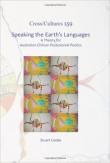AustLit
Latest Issues
AbstractHistoryArchive Description
Speaking the Earth’s Languages brings together for the first time critical discussions of postcolonial poetics from Australia and Chile. The book crosses multiple languages, landscapes, and disciplines, and draws on a wide range of both oral and written poetries, in order to make strong claims about the importance of ‘a nomad poetics’ – not only for understanding Aboriginal or Mapuche writing practices but, more widely, for the problems confronting contemporary literature and politics in colonized landscapes.
The book begins by critiquing canonical examples of non-indigenous postcolonial poetics. Incisive re-readings of two icons of Australian and Chilean poetry, Judith Wright (1915–2000) and Pablo Neruda (1904–1973), provide rich insights into non-indigenous responses to colonization in the wake of modernity. The second half of the book establishes compositional links between Aboriginal and Mapuche poetics, and between such oral and written poetics more generally.
The book’s final part develops an ‘emerging synthesis’ of contemporary Aboriginal and Mapuche poetics, with reference to the work of two of the most important avant-garde Aboriginal and Mapuche poets of recent times, Lionel Fogarty (1958–) and Paulo Huirimilla (1973–).
Speaking the Earth’s Languages uses these fascinating links between Aboriginal and Mapuche poetics as the basis of a deliberately nomadic, open-ended theory for an Australian–Chilean postcolonial poetics. 'The central argument of this book,' the author writes, 'is that a nomadic poetics is essential for a genuinely postcolonial form of habitation, or a habitation of colonized landscapes that doesn’t continue to replicate colonialist ideologies involving indigenous dispossession and environmental exploitation.' [from the publisher's website]
Publication Details of Only Known VersionEarliest 2 Known Versions of
Works about this Work
-
The Raw and the Cooke
2015
single work
essay
— Appears in: Australian Poetry Journal , vol. 5 no. 2 2015; (p. 66-78) 'Stuart Cooke is a well-travelled poet. Although he now resides in Brisbane, where he is a lecturer in creative writing at Griffith University, he draws upon the Kimberley and Chile in his writing. From this experience, his project as a poet, critic and editor could be said to be one of decentring Australian poetics, of taking it away from its power bases in Sydney and Melbourne and situating it in far less familiar spaces. In this essay, I will focus on three of his works: Departure Into Cloud, Bulu Line and Speaking the Earth's Languages. While my essay in in three distinct parts, corresponding to the three books, I return to certain themes and questions throughout. In considering Cooke's works together, I want to acknowledge his important contribution to poetry in Australia. But his works are simply a starting point, a place of departure, towards a different ecosystem than what we currently have.' (Introduction 67) -
Bridie McCarthy Reviews 'Speaking the Earth’s Languages'
2014
single work
review
— Appears in: Plumwood Mountain [Online] , February 2014;
— Review of Speaking the Earth's Languages : A Theory for Australian-Chilean Postcolonial Poetics 2013 single work criticism -
Review : Speaking the Earth’s Languages : A Theory for Australian-Chilean Postcolonial Poetics
2014
single work
review
— Appears in: JASAL , vol. 14 no. 5 2014;
— Review of Speaking the Earth's Languages : A Theory for Australian-Chilean Postcolonial Poetics 2013 single work criticism -
Nicholas Jose Reviews Speaking the Earth’s Languages : A Theory for Australian-Chilean Postcolonial Poetics
2014
single work
review
— Appears in: Cordite Poetry Review , 1 February no. 45.0 2014;
— Review of Speaking the Earth's Languages : A Theory for Australian-Chilean Postcolonial Poetics 2013 single work criticism
-
Nicholas Jose Reviews Speaking the Earth’s Languages : A Theory for Australian-Chilean Postcolonial Poetics
2014
single work
review
— Appears in: Cordite Poetry Review , 1 February no. 45.0 2014;
— Review of Speaking the Earth's Languages : A Theory for Australian-Chilean Postcolonial Poetics 2013 single work criticism -
Review : Speaking the Earth’s Languages : A Theory for Australian-Chilean Postcolonial Poetics
2014
single work
review
— Appears in: JASAL , vol. 14 no. 5 2014;
— Review of Speaking the Earth's Languages : A Theory for Australian-Chilean Postcolonial Poetics 2013 single work criticism -
Bridie McCarthy Reviews 'Speaking the Earth’s Languages'
2014
single work
review
— Appears in: Plumwood Mountain [Online] , February 2014;
— Review of Speaking the Earth's Languages : A Theory for Australian-Chilean Postcolonial Poetics 2013 single work criticism -
The Raw and the Cooke
2015
single work
essay
— Appears in: Australian Poetry Journal , vol. 5 no. 2 2015; (p. 66-78) 'Stuart Cooke is a well-travelled poet. Although he now resides in Brisbane, where he is a lecturer in creative writing at Griffith University, he draws upon the Kimberley and Chile in his writing. From this experience, his project as a poet, critic and editor could be said to be one of decentring Australian poetics, of taking it away from its power bases in Sydney and Melbourne and situating it in far less familiar spaces. In this essay, I will focus on three of his works: Departure Into Cloud, Bulu Line and Speaking the Earth's Languages. While my essay in in three distinct parts, corresponding to the three books, I return to certain themes and questions throughout. In considering Cooke's works together, I want to acknowledge his important contribution to poetry in Australia. But his works are simply a starting point, a place of departure, towards a different ecosystem than what we currently have.' (Introduction 67)
- Gularabulu : Stories from the West Kimberley 1983 selected work criticism life story oral history
- Reading the Country : Introduction to Nomadology 1984 anthology prose
- Yerrabilela Jimbelung : Poems about Friends and Family 2008 selected work poetry
- Minyung Woolah Binnung : What Saying Says : Poems and Drawings by Lionel Fogarty 2004 selected work poetry
- Nurlu Songs of the West Kimberleys 1990 single work thesis




